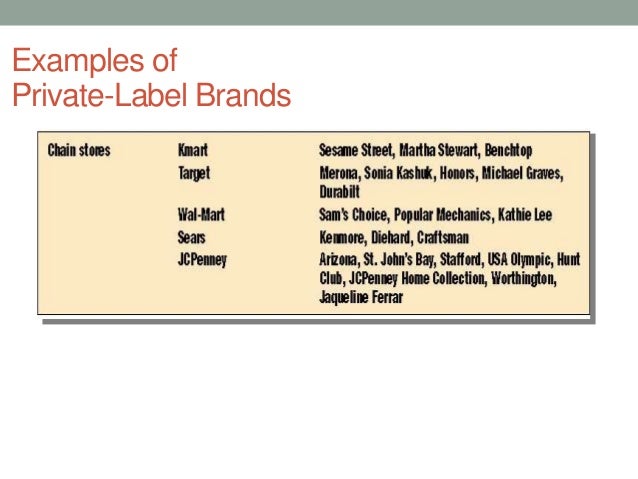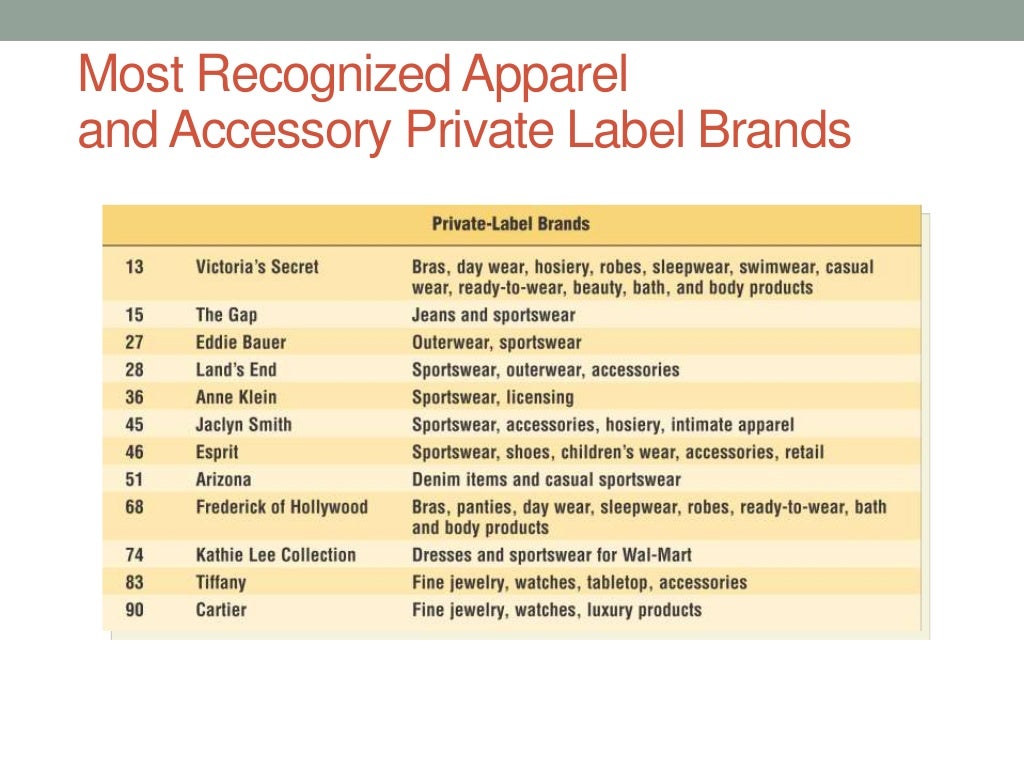44 role of private labels in retail
Private labels - SlideShare Since private labels are unique to one retail chain, there is the possibility for retailers to cultivate a sense of brand loyalty. By nurturing customer loyalty, retailers can have significant advantage over its competitors. ... Local politics plays a big role in setting up ventures. 37 38. ECONOMIC FACTORS Inflation: Due to inflation the cost ... Private label - Wikipedia A private label, also called a private brand or private-label brand, is a brand owned by a company, offered by that company alongside and competing with brands from other businesses. [1] [2] A private-label brand is almost always offered exclusively by the firm that owns it, although in rare instances the brand is licensed to another company. [3]
The role of private label tiers and private label naming strategies in ... The evolution of private labels (PL) is a recent trend in the retail industry: many retailers now manage a PL portfolio that includes multiple value propositions, as well as various brand name strategies. Little research has been done, however, on how this combination of PL strategies conditions the results of the retailer that manages them.

Role of private labels in retail
The future of Private Brands and its Role in Retail Private Label quality continues to improve beyond its sales growth. Retailers & Private Label manufacturers should leverage its strengths Amazon is scaling back private label business: WSJ | Retail Dive Amazon has been "drastically" cutting back the number of items it sells under its private label brands, according to a Wall Street Journal report that cited anonymous sources. According to the ... Private Labels: Their growing importance in Retailing - ISME The latest market share data on Private labels shows that their popularity continues to spread across India and Europe. Retailer brands now account for at least 30% of all products sold in 15 countries, the greatest number ever, according to Nielsen data compiled for PLMA's 2014 International Private Label Yearbook [4].In India the share of Private label in the modern retail is about 7%.
Role of private labels in retail. The New Appeal of Private Labels - hbr.org We have been studying the role private labels play in consumer goods markets, and we have found that they are no longer simply category killers. ... Cott gained 30 % of the market share of the ... Private labels and the specific retailer's role - IDEAS/RePEc Private labels (or own-brand products) play a prominent role for consumers in their perception of retailers' reputation. In a model where products are experience goods, a retailer has the opportunity to introduce his own store brand, or to sell a branded product. The Advantages of Private Label Branding | Your Business Exclusivity. Private label branding is one way to separate yourself from competitors. One of the greatest attributes of private labels is that you inherently have an exclusive right to sell the products. If you market the brand well and create demand for it, you benefit as your customers' only source. This contributes to your ability to charge ... Private Label Brands Roar At Retail - Forbes Overall, private labeling is a positive trend, although, as with everything, there will be winners and losers. It helps manufacturers who need capacity, creates loyalty for retailers who can get...
Private labels: The role of manufacturer identification, brand loyalty ... The purpose of this paper is to analyze product, retailer, and individual factors from the private label brand that influence consumers' loyalty and purchase intention; along with the influence of the manufacturer identification on the product package on purchase intention. Design/methodology/approach Private Label is a Winning Strategy for Retail Success The reason lies in the fact that private label products are exclusively available in the store that produces them. Agility to respond to trends - Agility relates to fast response and flexibility. Since retailers have greater control over their brands, they can innovate and change faster. Brands Versus Private Labels: Fighting to Win In supermarkets, for example, private labels have developed well beyond the traditional staples such as milk and canned peas to include health and beauty aids, paper products such as diapers, and... The Role of Private Brands and the Retail Planning Process Private brands are, of course, those brands which are owned and produced either directly by retailers themselves, or a pool of retailers. Examples include Costco's Kirkland Signature or (originally A&P's) Eight O'Clock Coffee, which later took on a life of its own. The trend is extremely important to a retailer's survival for a number of reasons.
The Growth of Private Label Food Brands Private Label Growing in All Channels. According to the PLMA, "private-label sales grew 2.5% in 2014, versus 1.1% for national brands." A Wells Fargo analyst John Baumgartner reports Kroger's projection that its Simple Truth private label brand, now at approximately $1.2 billion in annual sales, may double in the next few years. Private Label Definition - What is Private Label - Shopify A private label product is manufactured by a contract or third-party manufacturer and sold under a retailer's brand name. As the retailer, you specify everything about the product - what goes in it, how it's packaged, what the label looks like - and pay to have it produced and delivered to your store. This is in contrast to buying ... retailing-private label - SlideShare • Private Labels are Retailers own, control, and exclusively sell store brands • Private Label are a 'Good Alternative' to Other Brands, Offering the Same Quality & Value • Private labels are regarded as good Value for Money, and Quality on Par with the Big Brands. 3. The Role of Private Label in Retail - Core A private label can be a useful product testing strategy for the market, the potential of which could increase in the future. The underlying reasons for a business brand are: independence in creating a business policy, ie independence of the manufacturer; increase in profits; differentiating from competition, and creating loyal consumers.
Private Label Brands Surge As Consumers Purge Closets - Forbes Private labeling was already a staple of big-box retailers before the pandemic, for retail giants like Walmart and Target, and for major niche players. In 2018, Urban Outfitters reported that over...
Turning private labels into powerhouse brands - McKinsey Even as retailers have introduced new private-label products and brands over the years, few have thought through the role of private labels in their businesses. Some private-label brands and products come into being simply because, for instance, a vendor offers to make a product at a lower cost and higher margin rate than a national brand.
What is Private Labeling? [Definition, Pros, Cons & More] As a retailer, you have control over every part of your private label line. You can define the ingredients or components. You can control things down to the color and shape of the product. You control how the product is branded and marketed, too. When you sell branded products, people aren't becoming loyal to your company.
Pros and Cons of private labelling - Orderhive Selling products with private labels has absolutely zero impact on their cost price, but it provides great control over pricing as we discussed earlier. Having private labels allows you to price your products on the basis of your marketing strategy and run your sales independently. A lot of suppliers are unwilling to spend money on marketing ...
Is Private Label Merchandise Right for Your Retail Store? If you are a retailer who matches prices, private-labeled goods provide a great benefit. In many cases, you can get your supplier to make you the same product, but without their label on it. Then you can still charge full price for your product when your competition puts the branded version on sale.
The battle for brands in a world of private labels - Deloitte private labels represent 20 percent of grocery store and 18 percent of supercenter sales. 4 furthermore, store brand products were 31 percent cheaper across product categories than their national brand counterparts. 5 store brands are not just a recession related phenomenon - u.s. store brand sales continue to grow over the long run despite …
4 Benefits of Private Labeling for Your Brand - Century Label Private label products use the retailer's private label brand. It is up to the end retailer to design the manufacturing, packaging, and marketing - not up to you as the creator of the good, eliminating added costs. You only pay the product cost without a premium for brand name or expensive marketing campaigns. Lower Operating Costs
Premium private label: how product value, trust and category ... Premium private labels (PPLs) are applied to products with distinctive features with prices equal, and sometimes even higher, than those of the category leaders. The objective of the retailers is to obtain, in the minds of consumers, the same positioning of national brands.
Private labeling: Process, Advantages, and Disadvantages In the retail world, it is difficult to gain the loyalty of people. As they switch very easily when they are offered better prices in other stores. But private labeling is the best way to make your customers loyal to your products because whenever they want to buy your products, they will come to only you. Disadvantages of private labeling
Private Labels: Their growing importance in Retailing - ISME The latest market share data on Private labels shows that their popularity continues to spread across India and Europe. Retailer brands now account for at least 30% of all products sold in 15 countries, the greatest number ever, according to Nielsen data compiled for PLMA's 2014 International Private Label Yearbook [4].In India the share of Private label in the modern retail is about 7%.
Amazon is scaling back private label business: WSJ | Retail Dive Amazon has been "drastically" cutting back the number of items it sells under its private label brands, according to a Wall Street Journal report that cited anonymous sources. According to the ...
The future of Private Brands and its Role in Retail Private Label quality continues to improve beyond its sales growth. Retailers & Private Label manufacturers should leverage its strengths
















Post a Comment for "44 role of private labels in retail"